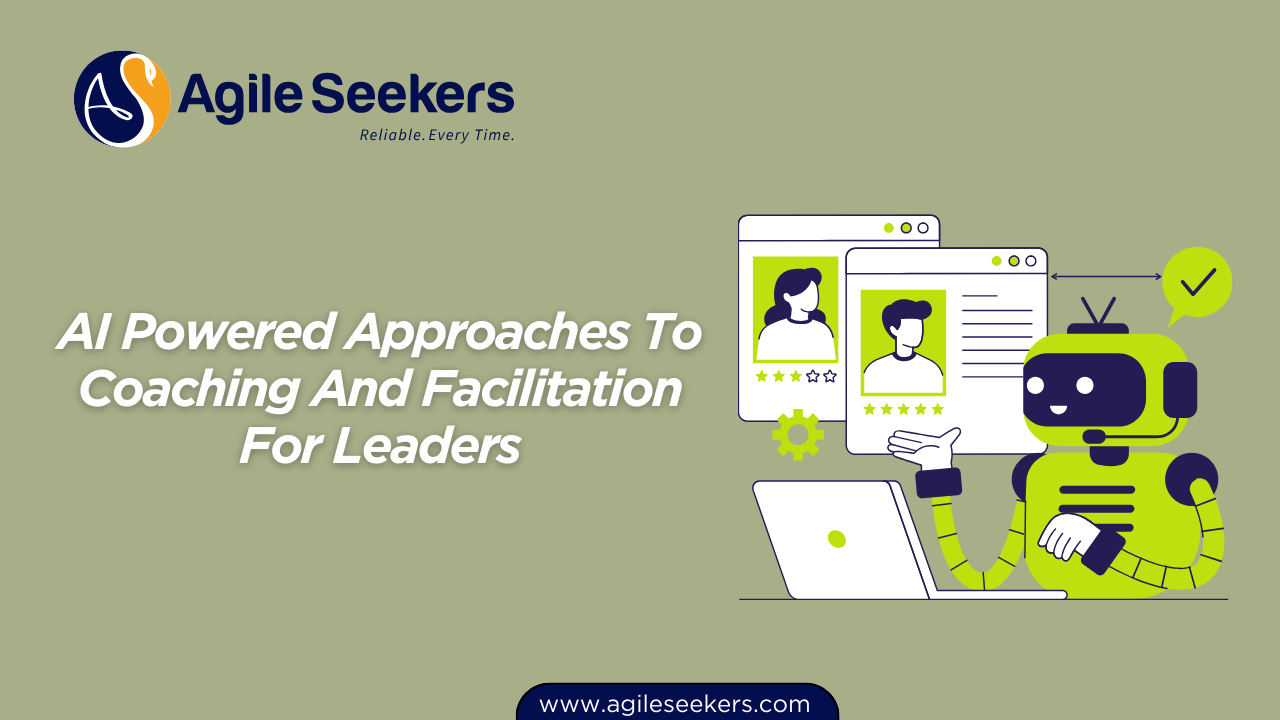AI Powered Approaches To Coaching And Facilitation For Leaders

Leadership today requires more than setting direction and tracking performance. Leaders are expected to coach, mentor, and facilitate meaningful change. Traditional coaching skills are still essential, but artificial intelligence (AI) is now reshaping how leaders can guide teams, foster collaboration, and unlock potential at scale.
This post explores how AI-powered approaches enhance coaching and facilitation, with practical applications, benefits, and tools leaders can adopt.
Why Leaders Need AI in Coaching and Facilitation
Leadership coaching often revolves around three areas: developing individuals, enabling team collaboration, and aligning outcomes with strategy. The challenge is that leaders rarely have the time or data-driven insights to support each person effectively.
Here’s where AI makes a difference:
-
Personalization at scale – AI analyzes communication patterns, performance data, and behavioral cues to tailor feedback.
-
Objective insights – It removes bias by highlighting patterns leaders may overlook.
-
Real-time support – AI-powered tools can suggest coaching prompts, reflection exercises, or facilitation techniques during conversations.
Instead of replacing human skills, AI amplifies a leader’s ability to coach and facilitate effectively.
AI in Leadership Coaching
Coaching is about unlocking a person’s potential. With AI, this becomes more structured and data-informed. Let’s look at some ways leaders can apply AI in coaching.
1. Personalized Learning Journeys
AI can analyze skills, behaviors, and career aspirations to design individual development paths. Tools like Coursera’s AI learning recommendations and LinkedIn Learning Insights show how adaptive learning keeps coaching relevant.
Leaders can integrate these insights into one-on-one coaching by:
-
Identifying skill gaps.
-
Suggesting targeted resources.
-
Tracking progress in real time.
2. Conversational AI for Reflection
Chat-based AI tools can guide employees through self-reflection questions before or after coaching sessions. This helps individuals articulate goals and challenges, making coaching discussions deeper and more productive.
3. Feedback Analysis
AI sentiment analysis can scan surveys, emails, or meeting transcripts to highlight team morale and engagement trends. Leaders then use this data to frame coaching conversations around real issues rather than assumptions.
AI in Facilitation
Facilitation is about creating an environment where groups can collaborate, solve problems, and innovate. AI strengthens this role by offering structure, insights, and inclusivity.
1. Smarter Meeting Facilitation
AI tools like Miro AI or Otter.ai assist in capturing ideas, clustering themes, and generating action items from discussions. Leaders can focus on guiding conversations while AI handles documentation and synthesis.
2. Inclusive Participation
In workshops, AI can track speaking time and suggest prompts to ensure quieter voices are heard. This prevents dominance by a few individuals and promotes psychological safety.
3. Scenario Simulations
Leaders can use AI-driven simulations to test business scenarios during facilitation sessions. These simulations provide real-time feedback, allowing teams to make informed decisions faster.
Practical Benefits for Leaders
When leaders use AI-powered approaches in coaching and facilitation, three benefits stand out:
-
Time Efficiency – AI reduces manual effort in preparing coaching sessions, analyzing feedback, and documenting outcomes.
-
Deeper Insight – Leaders gain a clearer view of team dynamics, strengths, and stress points.
-
Sustainable Growth – Continuous, data-informed coaching and facilitation build resilience and adaptability across teams.
Real-World Applications
Here’s how AI is already reshaping leadership practices:
-
Agile Leaders & Change Agents use AI to analyze transformation progress, track adoption metrics, and guide coaching conversations with stakeholders. Enrolling in AI for Agile Leaders & Change Agents Certification helps leaders develop these capabilities in structured ways.
-
Project Managers adopt AI-driven dashboards to facilitate status meetings. Instead of spending time preparing slides, they coach teams using predictive data from tools like Jira AI. The AI for Project Managers Certification Training covers these practices.
-
Product Owners use AI to simulate customer journeys and facilitate backlog prioritization workshops. This ensures alignment between strategy and delivery. The AI for Product Owners Certification Training explores these applications.
-
Scrum Masters integrate AI tools to support sprint retrospectives, analyzing team sentiment and identifying patterns over time. The AI for Scrum Masters Training equips Scrum Masters with practical techniques for coaching and facilitation.
Ethical Considerations
AI coaching and facilitation must balance technology with trust. Leaders need to:
-
Be transparent about when AI is used.
-
Protect employee privacy when analyzing communication data.
-
Ensure AI insights remain a complement, not a substitute, for human empathy.
External resources such as World Economic Forum’s AI ethics principles provide useful frameworks leaders can apply.
Building AI Skills as a Leader
Adopting AI-powered approaches requires both mindset and skillset. Leaders can start small:
-
Use AI note-taking assistants in meetings.
-
Experiment with AI-driven feedback surveys.
-
Encourage teams to use AI-powered brainstorming tools.
From there, formal training helps leaders integrate AI into their leadership style with confidence. Certifications like the ones offered at AgileSeekers bridge this gap by combining leadership principles with AI application.
Final Thoughts
AI is not replacing the human side of leadership. Instead, it’s giving leaders sharper tools for coaching and facilitation. With data-driven insights, personalized learning, and real-time facilitation support, leaders can guide their teams with greater impact.
The leaders who embrace AI-powered approaches today will stand out as trusted coaches and facilitators tomorrow.
Also read - The Role of AI in Building Agile Transformation Roadmaps
Also see - Why Agile Change Agents Need AI Skills To Stay Relevant




















